The sudden resignation of Bolivia's Evo Morales sent shockwaves throughout Latin America, where the indigenous leader had been the last survivor among a wave of leftist leaders swept to power two decades ago as commodity prices soared.
But the upheaval that has recently rocked the region, threatening Trump allies and anti-imperialist governments alike, defies easy categorization. From Honduras to Chile, popular frustration with anemic economic growth, entrenched corruption and gaping inequality is driving the region's middle classes to rebel against incumbents of all ideological bents in what has been dubbed the Latin American Spring.
"Latin America has been the frog in the boiling pot for a long time," said Marie Arana, the Peruvian-American author of a new book, "Silver, Sword & Stone," exploring five centuries of abuse and economic exploitation of the region's masses. "It's gotten to the point where it's less about ideology and more about practical matters as people for themselves see the rampant physical evidence that things are going wrong."
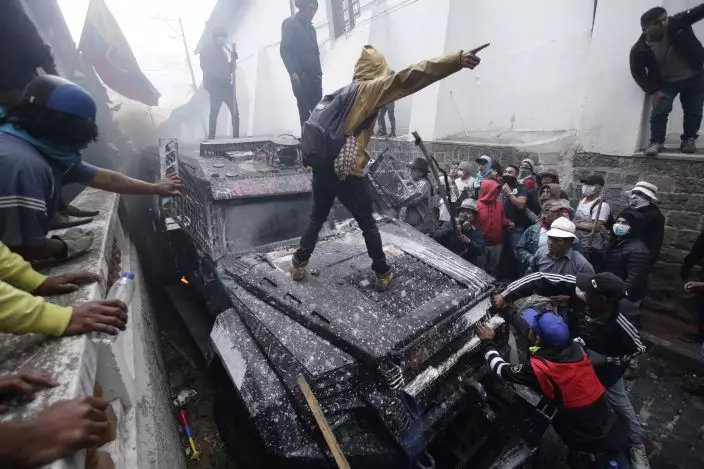
FILE - In this Oct. 9, 2019, file photo, anti-government demonstrators commandeer an armored vehicle during a nationwide strike against President Lenin Moreno and his economic policies in Quito, Ecuador. From Honduras to Chile, popular frustration with anemic economic growth, entrenched corruption and gaping inequality is driving the region’s middle classes to rebel against incumbents of all ideological bents in what has been dubbed by some the Latin American Spring. (AP PhotoCarlos Noriega, File)
The angst is greatest among the region's newly empowered middle class and the traditionally disenfranchised groups that made great strides when the left came to power at the end of the 1990s with the election of Hugo Chavez in Venezuela and Luiz Inácio Lula da Silva in Brazil. Around 90 million people entered the middle class in Latin America between 2000 and 2012, according to the United Nations, a feat that tracked with a boom in prices for the region's copper, soy and oil exports.
But as commodity prices have fallen, and leftist leaders once lionized for crusading against corruption are engulfed in scandals themselves, families earning enough for the first time in generations to pay taxes and send their kids to college are demanding higher-quality public services.
"The left had a very long stretch but it's unlikely to be repeated," said Michael Shifter, president of the Inter-American Dialogue. "Going forward, political cycles will be shorter, because governing is so much harder and expectations greater than ever."
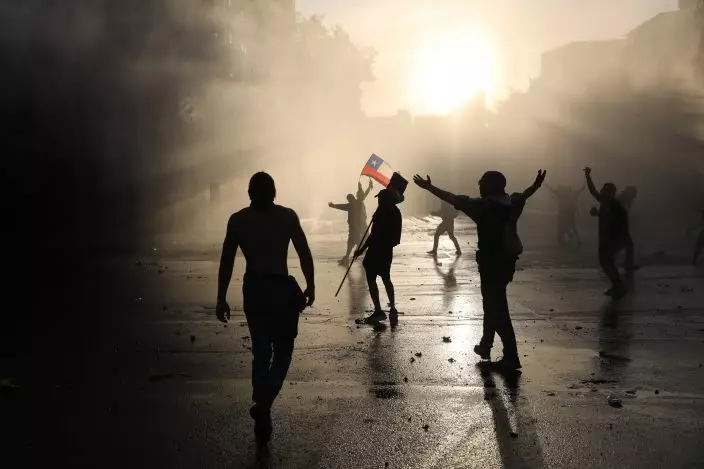
FILE - In this Oct. 31, 2019, file photo, demonstrators are sprayed by a police water cannon during an anti-government protest in Santiago, Chile. From Honduras to Chile, popular frustration with anemic economic growth, entrenched corruption and gaping inequality is driving the region’s middle classes to rebel against incumbents of all ideological bents in what has been dubbed by some the Latin American Spring. (AP PhotoRodrigo Abd, File)
Prior to Morales' resignation, the left had been hoping for a comeback following the 2017 election last year of far-right populist Jair Bolsonaro in Brazil.
In the past month alone, it has been re-energized by an uprising against fuel hikes in Ecuador, mass protests against right-wing leaders in Honduras and Chile, the release from prison of Lula in Brazil, a first-round win of the governing leftist coalition in Uruguay, and the resurgence of the Peronist party in October elections in Argentina following the spectacular failure of free market reforms there. Even embattled Venezuelan leader Nicolas Maduro has managed to outmaneuver his rivals to stay in power amid crippling U.S. sanctions and a cratering economy.
The raging discontent has been hailed on social media as the Latin American Spring — a reference to the tumult that, starting in 2011, toppled entrenched leaders in the Arab world.
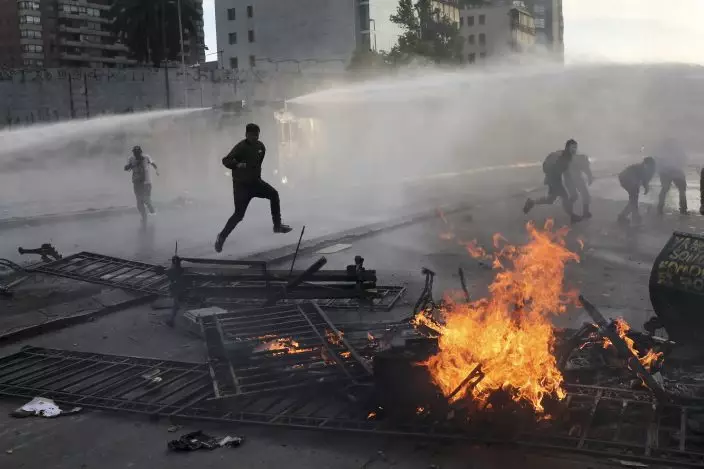
FILE - In this Oct. 29, 2019, file photo, anti-government protesters run from police spraying water cannons where a street barricade burns, set by demonstrators, in Santiago, Chile. From Honduras to Chile, popular frustration with anemic economic growth, entrenched corruption and gaping inequality is driving the region’s middle classes to rebel against incumbents of all ideological bents in what has been dubbed by some the Latin American Spring. (AP PhotoRodrigo Abd, File)
The left's resilience has been cheered on by Mexican President Manuel Lopez Obrador, who gave Morales asylum and whose pivotal win 16 months ago was seen as a bulwark against a rise of conservative, pro-U.S. leadership in the region, including President Ivan Duque in Colombia and Bolsonaro in Brazil.
Still, many expect the turbulence to continue, with attention now turning to the leftist governments in Nicaragua and Venezuela, which have been rocked by major upheaval of their own in the past year. On Monday, President Donald Trump singled them out, saying Morales' departure sends a "strong signal to the illegitimate regimes in Venezuela and Nicaragua that democracy and the will of the people will always prevail."
Even some on the left acknowledge that, as expectations have risen in recent years, leaders haven't done enough to strengthen institutions and meet demands for better health care, schooling and wages.
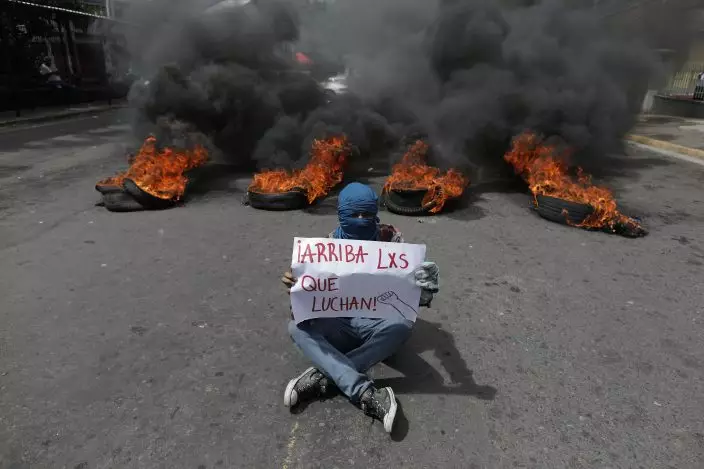
FILE - In this Oct. 24 2019, file photo, man holds a sign that reads in Spanish "Hurray for those who fight" as he sits in front of a street blocked by a burning barricade, during a protest to demand the resignation of President Juan Orlando Hernandez, in Tegucigalpa, Honduras. From Honduras to Chile, popular frustration with anemic economic growth, entrenched corruption and gaping inequality is driving the region’s middle classes to rebel against incumbents of all ideological bents in what has been dubbed by some the Latin American Spring. (AP PhotoElmer Martinez, File)
"People have risen out of poverty, but the left's rhetoric hasn't changed much from when it came into power," said Amauri Chamorro, a Brazilian-Ecuadorean analyst who has advised many leftist political parties throughout the region.
Still, Chamorro says the biggest obstacle facing Latin America's left has been the fraud allegations that have left them open to campaigns by their conservative adversaries who, struggling to defeat them at the ballot box, have slapped them with corruption charges. These include Lula in Brazil, who was leading in the polls before he was jailed, as well as former Ecuadorean President Rafael Correa and Cristina Fernandez de Kirchner, who is preparing to return to power as Argentina's vice president-elect.
In many ways Morales makes for an odd victim, however. Unlike his fellow anti-U.S. allies, he has governed since 2006 as a pragmatist, delivering some of the fastest economic growth in the world by cutting deals with major international energy firms and ushering in a period of economic stability unseen in generations. The former coca farmer also tore down decades of ethnic discrimination against his fellow indigenous Bolivians who had long been denied political power.
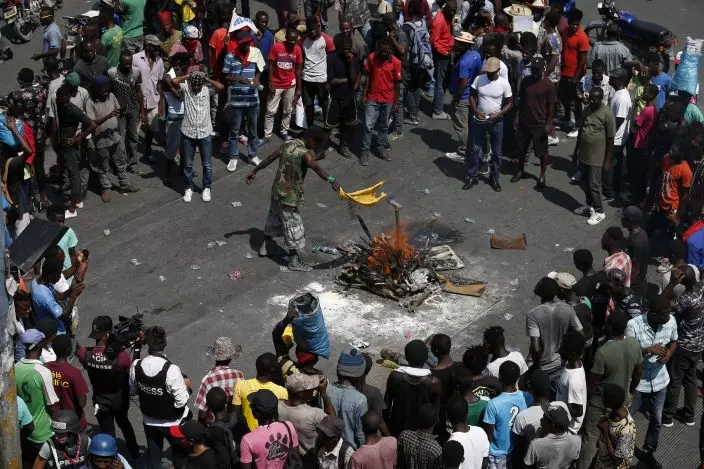
FILE - In this Oct. 17, 2019, file photo, a man waves an article of clothing in the smoke from the fire of a voodoo ceremony intended to confer protection to the people, as protesters call for the resignation of President Jovenel Moïse in the Delmar area of Port-au-Prince, Haiti. From Honduras to Chile, popular frustration with anemic economic growth, entrenched corruption and gaping inequality is driving the region’s middle classes to rebel against incumbents of all ideological bents in what has been dubbed by some the Latin American Spring. (AP PhotoRebecca Blackwell, File)
His downfall came as he clung to power, refusing to recognize the results of a referendum that would have banned him from seeking a fourth consecutive term. A mission by the Organization of American States sent to audit the results of the Oct. 20 presidential vote found a slew of irregularities, including the use of hidden servers to tabulate results and false signatures on tally sheets. Morales contends he was forced out by a coup.
"The left was attractive for a very long time and justifiably so because it spoke for the people when nobody else did," said Arana. "But hopefully we've reached the point, with so much corruption and turmoil, that people realize the concept of a democratically elected dictator isn't working, just like the right-wing military dictatorships that preceded them didn't work."
Follow Goodman on Twitter: https://twitter.com/APjoshgoodman


